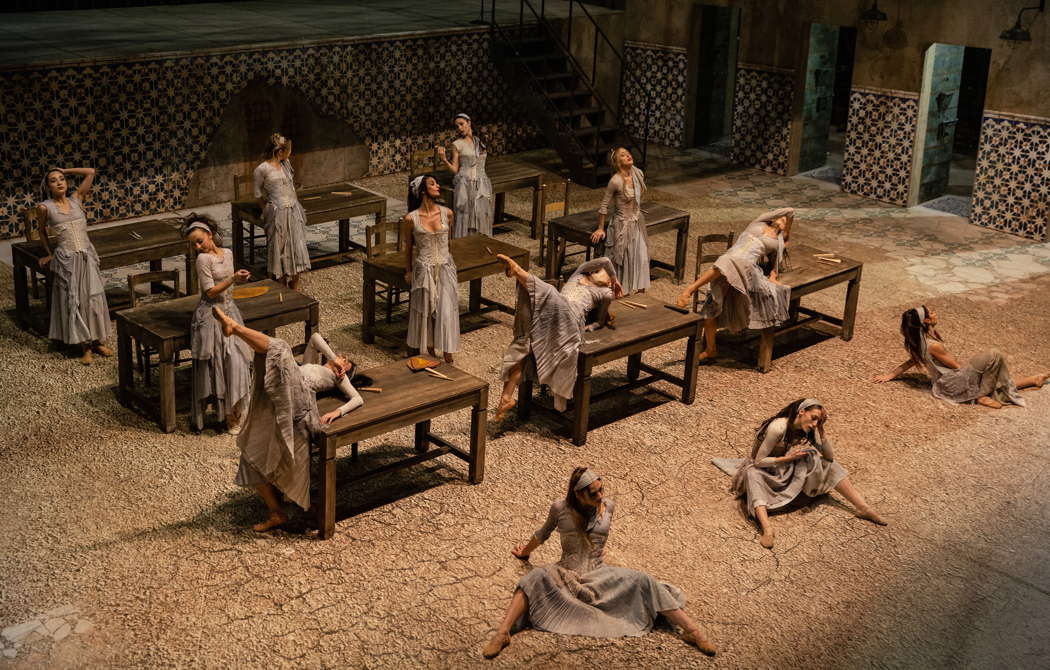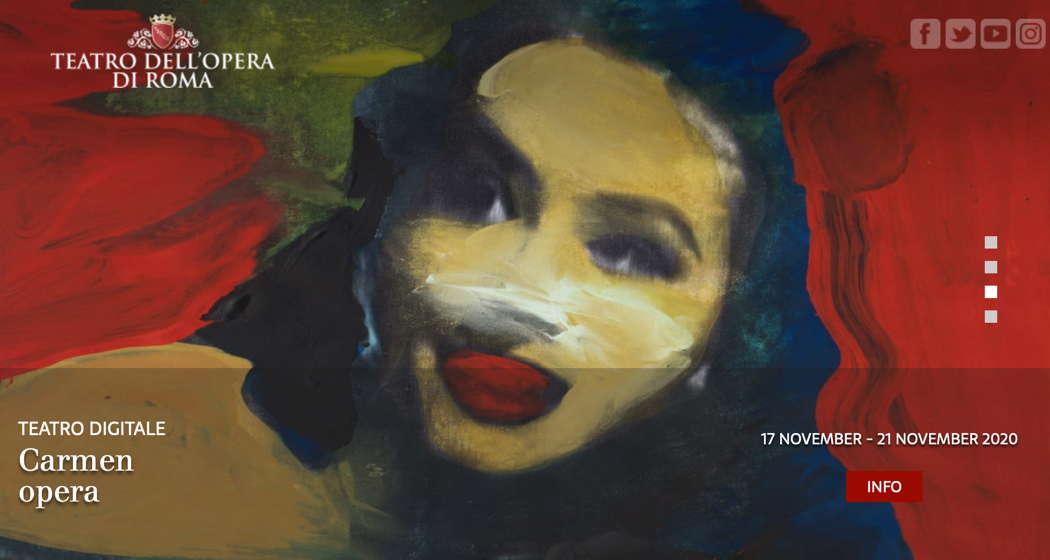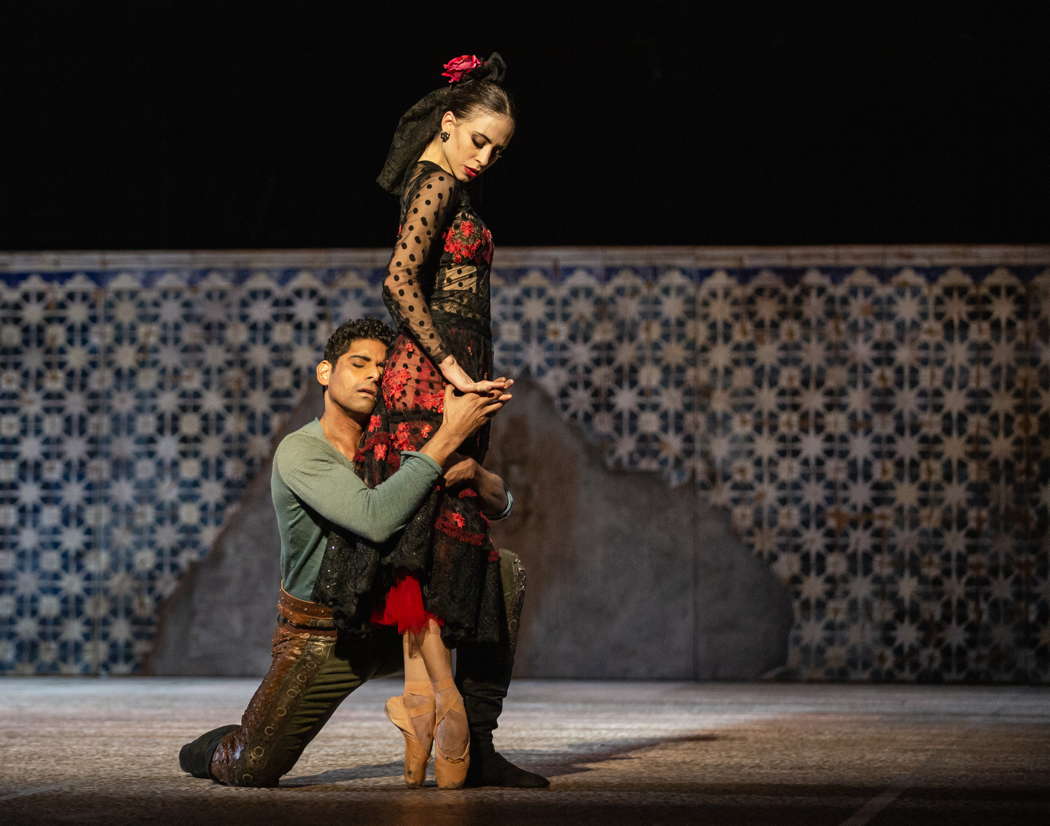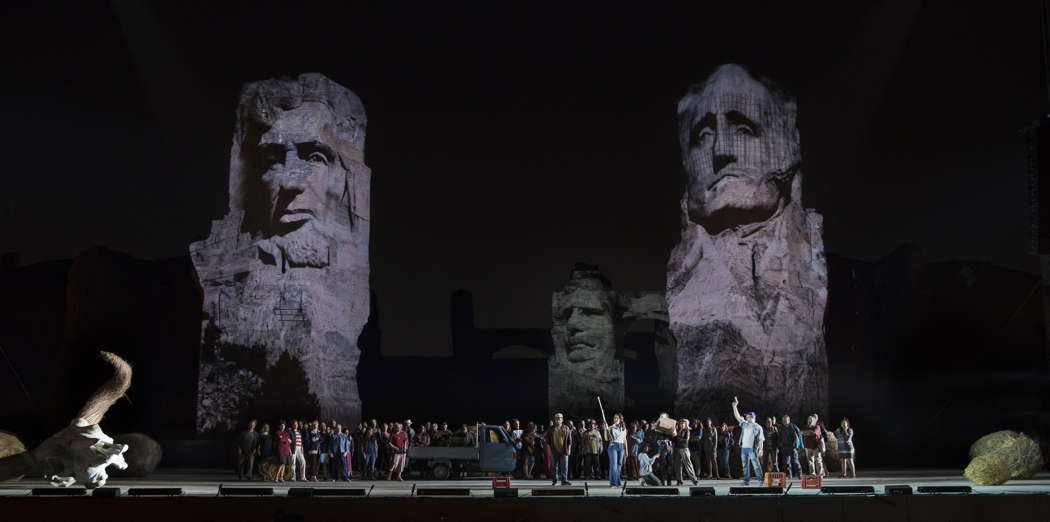- Philadelphia Orchestra
- Dunelm Records
- Ralph Vaughan Williams
- Amoris International
- Soviet Union
- Francisco Kraus Trujillo
- P J Harris
- Michael Delfín
Great Emphasis on Detail
GIUSEPPE PENNISI enjoys streamed performances of a Carmen double bill in Rome
Il Teatro dell'Opera di Roma concluded the 2019-2020 season on 17-18 November with a double bill about Carmen, both based on Prosper Mérimée's original novel: the Bizet opera on a libretto by Meilhac and Halévy and a Jira Bubeníček ballet where Bizet's music was molded with that by Manuel de Falla, Isaac Albéniz, Mario Castelnuovo-Tedesco and Gabriele Bonolis. Bonolis skillfully crafted the various compositions into a coherent score and provided the orchestration. In addition, the plot followed Mérimée more than Meilhac and Halévy did.

A scene from Jira Bubeníček's Carmen ballet. Photo © 2019 Yasuko Kageyama
These were not new productions, but streaming revivals of two successful stagings; pertinent reviews were published in Music & Vision Magazine on 7 July 2017 and on 5 February 2019. I refer to those reviews for an analysis of both productions as well as to the curious diplomatic dispute raised by the Mexican Ambassador in Rome because the 2017 production was set at the border with the United States, just where the 'Trump Wall' is being built.
The streaming of the two productions is now permanently on the Teatro dell'Opera website and can be seen and heard at operaroma.it - on the home page, there are two boxes on which to click: one for the opera and the other for the ballet. If one clicks on the banner 'Teatro Digitale', there is a list of the other productions available at no cost. A simple registration procedure is required. There are a couple of ads before the start of the performance. This is a good way to have an idea of Teatro dell'Opera's recent major productions. Other Italian theatres are following suit.

Detail from a 19 November 2020 screenshot of the operaroma.it website
Streaming is, of course, quite different from a live production. The viewer and the listener depend on the quality of the computer for both vision and sound. I have a very large computer screen and two decent loudspeakers; thus I could enjoy this double Carmen. These streaming productions are not a mere registration of what was on stage four and two years ago. They were manicured, so to say, by RAI, the state-controlled radio and television system. Therefore, they were like a cinema adaptation of the productions with great emphasis on detail.

Amar Ramasar and Rebecca Bianchi in Jira Bubeníček's Carmen ballet. Photo © 2019 Yasuko Kageyama
This was especially important for the 2017 opera production. It was conceived for the Terme di Caracalla summer season: a huge stage in impressive Rome ruins and an auditorium for an audience of four thousand. Obviously, then it was impossible to see many details especially of the stage direction.
The production is set by the Argentinian Valentina Carrasco in Trump's times. Samal Blak is the set designer. Luis Carvalho is responsible for costumes and Erika Rombaldoni and Massimiliano Volpini for choreography. The border police in charge of guarding the wall are quite rough. Don José is one of them. The Lilìa Pastìa tavern is a crowded brothel: in Rushmore, under the statues of prominent US Presidents, drug trafficking flourishes.

A scene from Bizet's opera Carmen at the Baths of Caracalla in Rome. Photo © 2017 Yasuko Kageyama
It did not bother me a bit in 2017. What does the streaming vision add to the 2017 viewing? Two main aspects: the very careful work on acting, also of the extras and of the children and the pervasive sensuality as well as sexy theme of the four acts – divided into two parts in the live performance.
The protagonists were both excellent actors and singers: Veronica Simeoni was a sensual and immoral Carmen, Roberto Aronica, a passionate and jealous Don José, Alexander Vinogradov a braggart Escamillo, and Rosa Feola a very sweet Micaela. Carmen's two friends - Daniela Cappiello and Anna Pennisi - were excellent; with them, Bizet rediscovered polyphonic singing at the end of the nineteenth century. Streaming added one point to the live production: in the oversized Terme di Caracalla, it was difficult to seize the very good French diction of all of them.
It is useful to recall that in the ballet, the libretto starts with Don José's capital punishment by hanging, and then a long flashback tells the story of his love for Carmen, a wild horse that no-one can either train or tame. On the contrary, Don José is a weak and almost shy fellow who wanted initially to become a priest and after enlisting in the Army becomes a serial killer. He murders, first, his lieutenant, then Carmen's husband, and finally Carmen herself. In fact, the libretto follows Mérimée more closely than a previous attempt: La Tragédie de Carmen created in 1983 by Peter Brook, where the original libretto of Bizet's opera was cut, pasted and revised, but not drastically changed. Some of Bizet's opera characters are not present in this new Carmen, most notably Escamillo and Micaela. Others are added following the novel: most significantly, Carmen's husband, García and a British general - one of Carmen's several lovers. The plot holds together quite well in two acts of roughly an hour each.
The streaming rendering is quite good but it does not focus on the details as much as Bizet's opera production. It is, however, very pleasant viewing and listening.
Copyright © 19 November 2020
Giuseppe Pennisi,
Rome, Italy

FURTHER LIVE CONCERT AND OPERA REVIEWS




